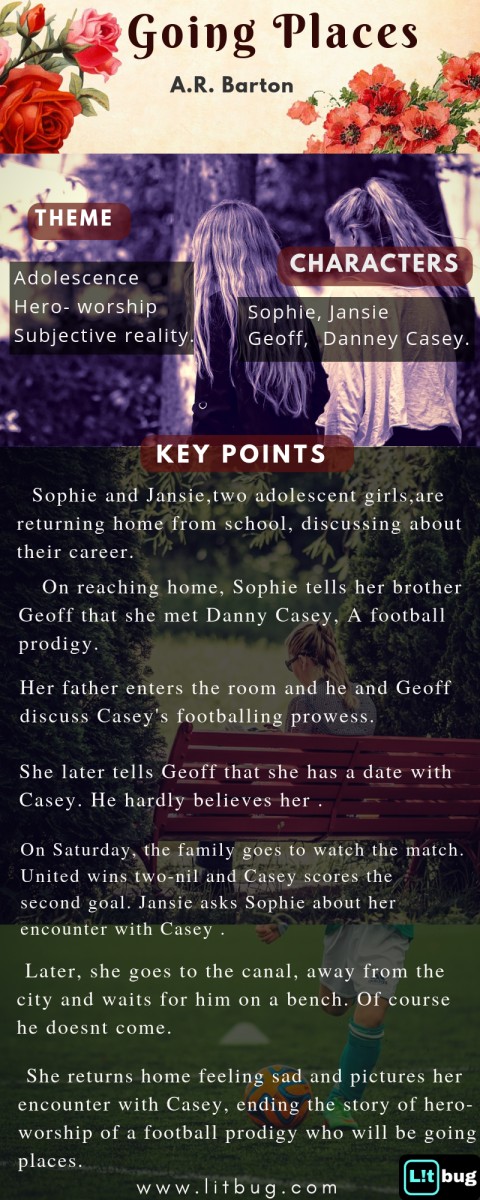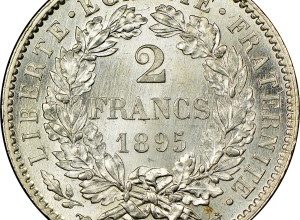
About the story
Going Places is a short story by A. R. Barton which presents the perceptions, dreams and desires of an adolescent girl. The readers get a glimpse in the life of the protagonist, Sophie: her relationship with her friends and family, her socio-economic position and her dreams and fantasies. Dealing with themes of, adolescence, escapism, hero worship and fantasizing, this story beautifully portrays the subtle intermingling of various emotions that one encounters in the giddy phase of life that is teenage.
Got No Time? Check out this Quick Revision by Litbug
Summary
Going Places opens up with a conversation between two adolescent girls, Sophie and Jansie, who are discussing their plans for the future. Sophie first expresses her wish to open a boutique, then of becoming a manager, followed by an actress before finally settling on becoming a fashion designer. We are told that all she wants is to do something ‘sophisticated‘. Her friend Jansie isn’t quite impressed with her romantic ideas as they had earlier decided on starting a biscuit factory. In the end, Sophie leaves Jansie standing in the rain before entering her house saying these words:
“If ever I come into money I’ll buy a boutique.”
“Huh – if you ever come into money… if you ever come into money you’ll buy us a blessed decent house to live in, thank you very much.”
Sophie’s father is eating a shepherd’s pie and his face is plump and sweaty. Her father, her mother and her little brother Derek are in the room. Derek provokes the father by saying that Sophie thinks “money grows on trees“. Sophie’s mother heaves a sigh as Sophie watches her back, bent over the sink and wonders at the incongruity of a delicate bow on her crooked back . She scans the house. The small, steamy and cluttered room is a depressing sight for her. She feels a tightening in her throat. Sophie cannot stand the sight any longer and goes to her brother Geoff‘s room.
Geoff is a quiet person who’s always busy with some work or the other. He is three years out of school and is working as an apprentice mechanic,working on the far side of the city. Sophie seems to envy his silence and the fact that he has seen and experienced the world which she hasn’t yet. Sophie begins to imagine what the world outside may be like and we find her dreaming about how she would sit on Geoff’s bike as the two ride to the fantastical place of her imagination :
She saw herself riding there behind Geoff. He wore new, shining black leathers and she a yellow dress with a kind of cape that flew out behind. There was the sound of applause as the world rose to greet them.
Sophie tells Geoff that she met Danny Casey, a young rising football player. Geoff, an ardent fan of Danny’s is initially unwilling to believe her. Just then, her father enters the room and switches on the TV. Geoff tells him that Sophie met Danny Casey which he dismisses altogether.The father and son debate over Casey’s skill and Geoff seems to root for the young player. Suddenly, Sophie remarks that Danny is going to buy a shop. Her dad would have none of it and tells her that even Geoff doesn’t actually believe her story about Danny.
Later, we find Sophie narrate Geoff her interaction with Danny . She tells him that they have fixed a date the next week. Geoff expresses disbelief at the story and tells her that Danny will never show up.
On Saturday, the family go to watch United play as usual. United win two-nil and the second goal is scored by none other than Danny Casey. Sophie glows with pride. The next week, her friend Jansie is quite nosey on all that has supposedly been happening between Sophie and Casey. Apparently, Geoff told Frank (Jansie’s brother ) about Sophie’s interaction with Casey. On realising that Geoff hasn’t revealed the date bit, Sophie limits her story up to the point where she asked Casey for the autograph.
Evening finds her walking along the canal on a sheltered path in a silent spot away from the city. She sits on a wooden bench beneath an elm tree generally used by lovers, eagerly waiting for Danny Casey. Danny doesn’t come. Sophie feels dejected over the fact that Danny doesn’t show up and can faintly see what is to follow. She even seems to be intensely aware of the feeling she is going through. She has fabricated her memory to such an extent that she cannot distinguish between what is real and what is not :
Now I have become sad, she thought. And it is a hard burden to carry, this sadness…“But we know how it was,” I shall tell myself, “Danny and me.”
On her way home, the despondent girl relives her ” interaction” with Danny with great detail. :
“I wonder — would you mind signing an autograph?”
His eyes are on the same level as your own. His nose is freckled and turns upwards slightly…
On Saturday, she goes to watch the football match where the nimble Danny beats the defenders and scores a crisp goal, sending the crowd roaring with happy approval.
Analysis
Going Places is a story which reflects an adolescent’s desire for going places. “Going Places” is an idiomatic phrase which refers to a promising young person’s likelihood of becoming successful and famous (e.g. ” She’s going places ” meaning she is going to be successful). The title Going Places captures the essence of the story. Sophie, the protagonist of the story is always imagining of ‘going places ‘ – of being rich and famous and it is from this point of reference that we can understand her nature and the reason why she acts the way she does.
Her conversation with Jansie in the beginning of the story hints at her tendency to romanticize about the future. She is indecisive about her career and switches from owing a boutique to being an actress to being a fashion designer because she has do “something sophisticated”.
However, her vague dreams of ‘going places’ is cut short when she enters her house. The small, cluttered house she lives in show that her economic condition isn’t at all sound. This is a drastic change of world Sophie inhabits. Earlier, we had seen her indulge in intense daydreaming. The moment she opens the door of her house, she is rudely awakened to the harsh reality she lives in and all her castles built in the air collapse. Consequently, she feels a little tightening on her throat. Also, soon after this realisation, she goes to Geoff’s room and again begins indulging in the world of fantasy. Her constant fantasizing of things therefore isn’t only a means of deriving pleasure but is also her desparate attempt at escaping from the reality she lives in. Simply put, her fantasizing and hero worship is also a means of escapism.
One sight in the room particularly arrests her attention:
Sophie watched her back stooped over the sink and wondered at the incongruity of the delicate bow which fastened her apron strings. The delicate-seeming bow and the crooked back.
The reader is provided an object where Sophie’s emotion is projected . Sophie identifies with the delicate bow on her mother’s crooked back. Not only has she been toying with the idea of becoming a fashion designer, Sophie has also just witnessed the ‘crooked back’ of reality- her small, cluttered house where the presence of her delicate dreams is completely out of place (incongruity of the delicate bow). This technique of projecting a character’s emotions onto an existing physical object shows the effective use of a literary device which makes the use of an objective correlative. The delicate bow on the crooked back becomes an objective correlative of the complex emotions Sophie has at the moment.
Her conversation with Geoff also betrays her fantasizing of the future. Geoff is set as a foil to Sophie’s character. Not only does he have character traits completely opposite to that of Sophie’s, he has seen the real world and knows that the world isn’t as fancy as it might seem to be. Sophie on the other hand dreams of a “world waiting for her” and a world rising to greet her. She is still obsessed with the idea of going places. One must try to understand her hero worship of Danny Casey in this context. It isn’t Danny Casey the person who interests her. It is the idea of Danny Casey which has captured her imagination. This is because Danny, the football prodigy, is definitely ‘going places’. Sophie wants to go places and Danny becomes a figure on whom she can project her desire.
Sophie’s fantasizing is a naive and harmless activity so long as it doesn’t distort her perception of the real world. However, there are times when she her imagination completely takes over her. A case in point is the scene where Danny scores a goal. “Sophie glows(ed) with pride”. In reality, she has nothing to feel proud about. It is Danny’s goal, not hers. However, she has internalized the hero worship to such an extent that she seems to locate a personal connection with the player where none exists. We see the full display of this tendency by the end of the story where Sophie believes her story and acts on it by actually going to meet Danny.
Going Places explores the different realms of expectation, fantasy, desire and perception of an adolescent. In all probability, Sophie never met Casey; her temperament as seen in her interaction with Jansie, her visit to the park and Danny’s absence all point towards the fact that her interaction with Danny on Royce’s window also never happened, except in her head. However, whether she did or did not actually meet Danny isn’t the issue. What is more important is the display of how one’s fantasy and desire colors one’s perception and shapes reality. Though Sophie might not have met Danny, she believes that she did, to the extent of going to the park and actually expecting him to arrive. This speaks volumes on the subjectivity of human experience and the perception of what constitutes the real.


